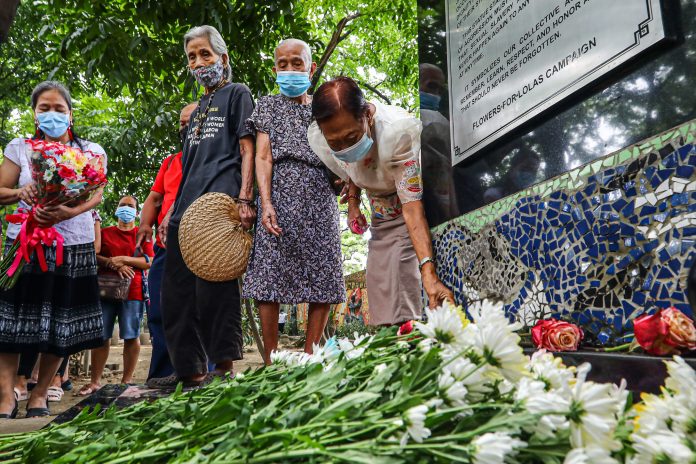Japan seeks to avoid the international issue of comfort women in the Philippines and other countries, including China, Taiwan, and South Korea through the Overseas Development Aid (ODA) as economic assistance.
This was the response of Lila Filipina’s Sharon Cabusao when asked about the removal of statues of “comfort women” during an online forum organized by the Geneva Graduate Institute.
The two-meter high “Lola” statue was installed in December 2017 along Baywalk, Roxas Boulevard in Manila. It was an unnamed woman wearing a traditional Filipino dress, blindfolded, with hands clutched to her chest.
However, it was removed on April 27, 2018, allegedly for a drainage improvement project.
It was later declared missing in August 2019 when the artist, Jonas Roces, failed to deliver the statue for its reinstallation at the Baclaran Church.
Another comfort woman statue —of a young woman with fists resting on her lap— was removed from the Catholic-run Mary Mother of Mercy shelter for the elderly and the homeless in San Pedro, Laguna province, only two days after its unveiling in January 2019.
The remaining comfort woman “Lola” statue previously owned by the late Nelia Sancho is now in Pandan, Antique.
Cabusao’s statement essentially echoes the context of a paper published last May 2022 in the Thai Journal of East Asian Studies (TJEAS) written by Shyntia Lo and Theofilus Jose Setiawan. The paper noted that the Japanese ODA in the Philippines indirectly bribed the government to remain silent about the Japanese atrocities during the Second World War.
In developing countries, Japan has implemented various types of cooperation called ODA such as providing funds, transferring technologies for social and economic growth, assistance for disaster relief, and so forth.
The website of the Japanese embassy in Manila noted that Japan has been, and continues to be, the largest ODA donor to the Philippines with a total assistance comprising 61 percent of the entire ODA that the country received in 2020.
It added that Japan’s first ODA project started in 1966. Since then, over US$34 billion in grants, loans, and technical assistance have been provided across the country.
The Department of Finance said in August 2021, Japan ODA reached a total of US$14.139 billion in loans contracted and committed over a 20-year period covering three administrations (Arroyo, Aquino, and Duterte), or 72 percent of the Philippines’ total bilateral loan portfolio during this period.
The Philippines is third among the countries that received the highest ODA in 2021, next to India and Bangladesh.
Through economic assistance, the TJEAS paper stressed, Japan manipulated ODA funding to suppress international public discourse on the issue of comfort women in the Philippines. By contrast, the Korean and Chinese governments continue to pressure Japan to formally apologize.
Although the Philippines was a victim of Japanese imperialism during the Second World War, the paper pointed out that the Philippine government responded positively to development aid loans and investments as economically beneficial, disregarding the rights of comfort women victims to voice demands through the Philippines government.
ODA, in addition to economic and development assistance, became a Japanese approach to the Philippines government to diminish the issue of international war crimes.
“Rational choice theory analysis indicates that the Philippine government has preferred the Japanese government over its own citizens by refusing to raise the issue of comfort women. The Philippines government, as a rational actor, prioritizes national interests such as development instead of addressing historical problems. The state, as rational actor, prioritizes its own interests over those of other parties, especially if in terms of obtaining Japanese ODA,” the paper said.
The UN Committee on the Elimination of Discrimination against Women (CEDAW) issued a decision on March 8, 2023, stating that the Philippines violated the rights of WWII victims of sexual slavery by failing to provide reparation, social support, and recognition commensurate with the harm suffered.
The Committee concluded that the Philippines had breached its obligations under CEDAW given the extreme severity of gender-based violence suffered by the victims, and the continuing discrimination against them regarding restitution, compensation, and rehabilitation.
The Philippines had failed to adopt appropriate legislative and other measures to prohibit all discrimination against women and protect women’s rights on an equal basis with men.
Atty. Dennis R. Gorecho heads the seafarers’ division of the Sapalo Velez Bundang Bulilan law offices. For comments, e-mail [email protected], or call 09175025808 or 09088665786
The views expressed in this article are the opinions of the author and do not necessarily reflect the editorial stance of LICAS News.









